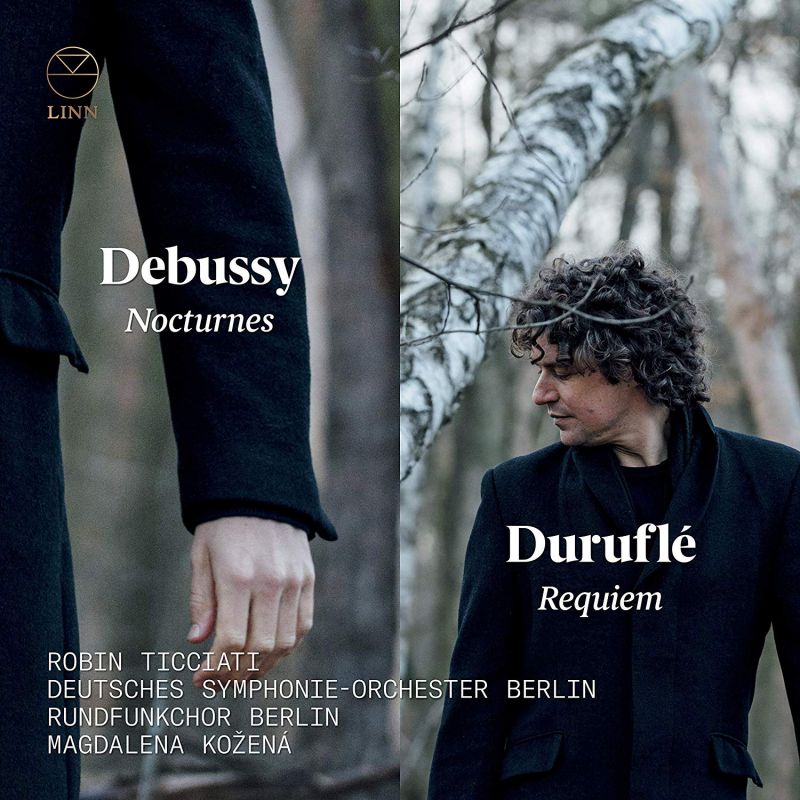DEBUSSY Nocturnes DURUFLÉ Requiem
View record and artist detailsRecord and Artist Details
Composer or Director: Claude Debussy, Maurice Duruflé
Genre:
Vocal
Label: Linn
Magazine Review Date: AW2019
Media Format: CD or Download
Media Runtime: 65
Mastering:
DDD
Catalogue Number: CKD623

Tracks:
| Composition | Artist Credit |
|---|---|
| Nocturnes |
Claude Debussy, Composer
Berlin German Symphony Orchestra Claude Debussy, Composer Robin Ticciati, Conductor |
| Requiem |
Maurice Duruflé, Composer
Berlin German Symphony Orchestra Berlin Radio Chorus Magdalena Kozená, Mezzo soprano Maurice Duruflé, Composer Robin Ticciati, Conductor |
Author: Edward Seckerson
So Debussy’s ‘Nuages’ drift lazily across our aural horizons, the nebulous finding clarity in the ever changing half-light, the chords shifting but the harmony static. The main hall of Berlin Radio opens atmospherically to this subtly layered music and Ticciati is in thrall to its mystery. The moment in the second tableau, ‘Fêtes’, where a distant procession is so remote that it barely catches one’s ear, is magical and one almost feels that Ticciati would be happier not to get caught up in advancing festivities. The colours here are muted, rhythms clean but subdued. Yes, he expertly balances the climactic counterpoint between the brassy parade and the swirling strings enveloping it, but there isn’t the splash of brilliance that some performances deliver at this point.
And yet he deftly draws our ear from the final falling interval of this tableau into the echoing and re-echoing chant of the winged ‘Sirènes’ wafting through the complex final segment. La mer is omnipresent but so too is Holst’s ‘Neptune’.
The Duruflé Requiem embraces a wholly different kind of mystique, opening the door on to a place, a world, where Debussy would never set foot. I love the way this piece takes the original Gregorian chant for each text of the Requiem liturgy and adorns them harmonically and texturally as if projecting them into our time. The kinship with Fauré is inescapable (Duruflé too excludes the ‘Dies irae’) though without the same degree of abiding sweetness.
Death and despair do surface fleetingly (the thunderous ‘Judgement’ of the ‘Libera me’ barely hints at shock and awe) but like Fauré before him Duruflé is all about offering consolation to the living. Ticciati plainly relishes the effulgence of the Kyrie, the Sanctus with its climactic paean of trumpets and massed voices, the balm of the ‘Pie Jesu’ (pace Lloyd Webber) with Magdalena KoŽená the reassuring maternal voice, the gorgeousness of the Agnus Dei – you can absolutely see why he opted for the full orchestral version, underpinned as it is by a deep comforter of organ sound.
Singing and playing strike me as excellent and this spiritual embrace of a piece is engineered to Linn’s highest standards.
Discover the world's largest classical music catalogue with Presto Music.

Gramophone Digital Club
- Digital Edition
- Digital Archive
- Reviews Database
- Full website access
From £8.75 / month
Subscribe
Gramophone Full Club
- Print Edition
- Digital Edition
- Digital Archive
- Reviews Database
- Full website access
From £11.00 / month
Subscribe
If you are a library, university or other organisation that would be interested in an institutional subscription to Gramophone please click here for further information.




